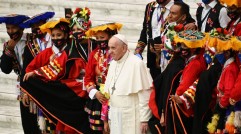Cuba's Tourism Boom Still Fails to Benefit Some Black Cubans
After Havana and Washington recently patched its long estranged diplomatic ties, the city of Havana in Cuba is reaping the fruit of having economic ties with powerful countries like the U.S. However, according to Thompson Reuters Foundation, despite the development on Cuba's tourism, some black Cubans still feel the effect of racial inequality as white people and those who are well-off are the only ones benefiting from it.
Miguel Campuzano Perez, a former soldier and a musician, said, "The black people don't have powerful families, and that continues generation to generation. The people benefiting from remittances are white; the landlords are white."
Despite the emergences of new hotels and restaurants in Cuba's capital, black Cubans believe that only those with money have the actual ability to invest on such type of structures. They also believe that the economic liberalization in Cuba has not worked for the benefit of those who are below poverty line.
Havana residents believe that time has changed and discrimination plays a very small impact on the inequality felt, but rather remittances, migration network and the massive change in the economic structure. The three factors are known to have a big impact in the growing gap between the rich and poor in Havana.
Canadian University professor Isaac Saney said, "The vast majority who left to live abroad happened to be white Cubans. They are sending remittances home and their relatives can invest in small businesses. This has led to an increase in racial inequality."
According to Learning English, the surge of U.S. tourists in Cuba has recently grown, and the Cuban tourism board has been unable to accommodate most of these tourists with small number of hotels. As a result, the government of Cuba has allowed its local residents to rent out their own homes for U.S. tourists.
Despite the positive influx, Cubans are mostly concerned about the preservation of its Old Havana. Questions about being able to maintain its concept and not to let it overcome by the U.S. culture surround their tourism business.
If worries about the influx of U.S. tourists are currently one of the issues, this might also change if in the future, one of the two Republican candidates' Marco Rubio and Ted Cruz wins the U.S. presidential elections. Apparently, both candidates criticized Obama's move to iron the country's relationship with Cuba.
Juan Carlos Dominguez of Cuba said, "If Americans are permitted to come to Cuba as tourists, it could be great. We are going to share with you what we have.. The future is bright."
Subscribe to Latin Post!
Sign up for our free newsletter for the Latest coverage!
* This is a contributed article and this content does not necessarily represent the views of latinpost.com













